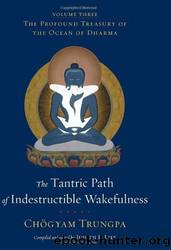The Tantric Path of Indestructible Wakefulness by Chogyam Trungpa & Judith L. Lief

Author:Chogyam Trungpa & Judith L. Lief [Trungpa, Chogyam & Lief, Judith L.]
Language: eng
Format: epub
ISBN: 9780834828605
Amazon: 1590308042
Publisher: Shambhala
Published: 2013-04-08T00:00:00+00:00
THE VAJRAYANA APPROACH TO DEITY: NO EXTERNAL SALVATION
The vajrayana approach to deity is very simple and basic: there is no external salvation. Although in vajrayana we speak a great deal about the experience of blessing, or adhishthana, and although we invoke all kinds of power and energy, those things do not come from some entity existing either within us or outside of us. We do not invoke blessings from any entity at all. The whole experience of invoking the deity is on a nonentity level. That is a very basic point.
In the vajrayana, we do not start with matches in order to light a fire. We just light the fire, and the fire just burns. That may sound impractical, but it actually does happen that way. There is no set point or spotlight to work with or work up to; there is no existing thing that constitutes the spotlight or focus. There is not any kind of basic reference point. Even if such a point of focus were equated with something psychological, such as the highest degree of awareness or the highest degree of confusion, it would not make any difference. We do not start from anywhere. When we invoke deities, there is no reference to a special existence. That is the difference between Hindu tantra and Buddhist tantra. In Buddhist tantra, we do not start from anywhere. We do not start from a word or by developing a name.
Bhaktivedanta was an Indian teacher who came to this country as the head of the Hare Krishna movement. In his teaching, he equated the mantra syllable OM with the Christian idea that âIn the beginning was the Word, and the Word was God,â which is quite accurate in a sense. He said that because of the truth of the belief that the Word is God, all the Hare Krishna disciples chant their devotional mantric incantations. Furthermore, Bhaktivedanta said that this truth was universalâand in the theistic world, it is universal, but it absolutely does not apply in the nontheistic world, or in the humanistic world, for that matter.
In Buddhist vajrayana, we do not have such a Word. We do not have a Word that is God, and we do not have God. We do not have anything. There is nothing to be made out of God, and nothing to make anything out of. In theism, I suppose the Word has a feeling of energy, proclamation, and brightness, and God is the basic accommodator and the fantastic overviewer that is within us or outside us, depending on the particular approach. But as far as Buddhist tantra is concerned, we do not have any of that.
The nontheistic view is crucial to the vajrayana. In hinayana, the question of nontheism is not particularly important. You do your little practice and you have your particular discipline. Everything is based on morality and discipline, on monastic rules and individual salvation. On the mahayana level, the theory of God or gods still does not play a very important part.
Download
This site does not store any files on its server. We only index and link to content provided by other sites. Please contact the content providers to delete copyright contents if any and email us, we'll remove relevant links or contents immediately.
| Confucianism | Feng Shui |
| I Ching | Jainism |
| Karma | Shintoism |
| Sikhism | Tao Te Ching |
| Taoism | Tibetan Book of the Dead |
| Zoroastrianism |
The Tao of Physics by Fritjof Capra(2272)
Human Design by Chetan Parkyn(2068)
The Diamond Cutter by Geshe Michael Roach(2058)
Feng Shui by Stephen Skinner(1938)
The Alchemy of Sexual Energy by Mantak Chia(1855)
Tao Te Ching by Lao Tzu(1834)
365 Tao: Daily Meditations by Ming-Dao Deng(1616)
Tao Tantric Arts for Women by Minke de Vos(1592)
Sun Tzu's The Art of War by Giles Lionel Minford John Tzu Sun(1531)
Sidney Sheldon (1982) Master Of The Game by Sidney Sheldon(1512)
Buddhism 101 by Arnie Kozak(1508)
Karma-Yoga and Bhakti-Yoga by Swami Vivekananda(1491)
The Analects of Confucius by Burton Watson(1429)
The Art of War Other Classics of Eastern Philosophy by Sun Tzu Lao-Tzu Confucius Mencius(1412)
The Way of Chuang Tzu by Thomas Merton(1361)
Tao te ching by Lao Tzu(1356)
The New Bohemians Handbook by Justina Blakeney(1351)
The Sayings Of by Confucius(1312)
Bless This House by Donna Henes(1267)
